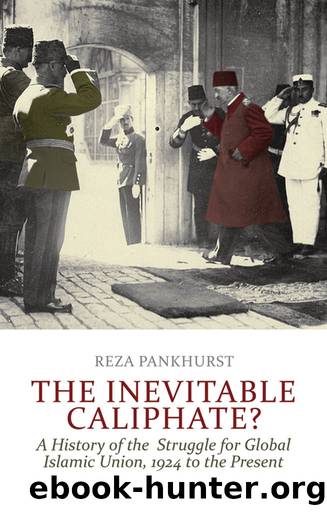The Inevitable Caliphate? by Pankhurst Reza

Author:Pankhurst, Reza [Pankhurst, Reza]
Language: eng
Format: epub
Publisher: Oxford University Press
Published: 2013-04-12T00:00:00+00:00
Addressing Domestic Grievances
While al-Zawahiri spent his days in an Egyptian jail after the assassination of Egyptian President Anwar Sadat, Bin Laden was busy providing logistical and financial support to the jihad in Afghanistan, having travelled there for the first time only days after the arrival of invading Soviet troops in 1979. 23 One was a political detainee who had plotted to overthrow the Egyptian government from the age of sixteen, inspired by the execution of Sayyid Qutb by the regime of Gamal Abdul-Nasser to go down the path to either martyrdom or victory against the corrupted elite. 24 The other was the youngest son of a family with close ties to the Saudi Arabiaâs rulers, motivated by the opportunity to fight Jihad against a foreign infidel invader, and who had spent time listening to the lectures of Mohammad Qutb, the elder brother of Sayyid Qutb, who was Professor of Islamic Studies at King Abdul Aziz University.
The differing trajectories of the two men cannot be understood without recognizing the differences in the basis of legitimacy on which the Egyptian and Saudi regimes are based, coupled with a reading from two different books, one known as The Absent Obligation and the other as Defence of the Muslim Lands . Though both books shared the subject of the obligation to wage jihad, they proffered very different conceptions of the nature of that obligation. One was written by Abdus-Salam Faraj and became a core text for al-Zawahiriâs Islamic Jihad group, the other was authored by Abdullah Azzam, who was recognized as the head of the Afghan-Arabs and one of Bin Ladenâs former teachers in Saudi Arabia.
Azzamâs book encouraged Muslims to take up arms against the Communist Soviet invader in defense of their religion, since âJihad today is individually obligatory [â¦] on every Muslim,â until âthe last piece of Islamic land is freed from the hands of the Disbelievers.â 25 On the other hand, Abdus-Salam Farajâs The Absent Obligation called for a struggle against the ânear enemy,â meaning âthe present rulers,â who âhave apostatised from Islam,â 26 since âfighting the enemy that is near to us comes before that which is far.â 27 Alternatively, Azzam held that âviolence should not be used against Muslim regimes no matter how far they had deviated from shariâa principles.â 28
The Egyptian regime was considered the near enemy, a government whose leader had apostatized from Islam due to a series of actions thought to be blasphemous, most importantly the failure to rule by the shariâa and the signing of a peace treaty which recognized the state of Israel in 1979. Living in Egypt and growing up under the shadow of Qutbâs execution and the subsequent failed Military Academy coup of 1974, al-Zawahiri had been arrested, tortured and thrown into jail with his co-defendants because they had, in his words, tried their best to âestablish an Islamic state.â 29
The situation in Saudi Arabia was very different, with the al-Saud family basing their legitimacy on Islam and the fact that they were the âguardians of the two holy placesâ (haramain) .
Download
This site does not store any files on its server. We only index and link to content provided by other sites. Please contact the content providers to delete copyright contents if any and email us, we'll remove relevant links or contents immediately.
| Africa | Americas |
| Arctic & Antarctica | Asia |
| Australia & Oceania | Europe |
| Middle East | Russia |
| United States | World |
| Ancient Civilizations | Military |
| Historical Study & Educational Resources |
The Battle of Mogadishu by Matt Eversmann & Dan Schilling(754)
The Confidence Men by Margalit Fox(710)
The Spymaster of Baghdad by Margaret Coker(676)
A History of the Muslim World since 1260: The Making of a Global Community by Vernon O. Egger(672)
Jack the Ripper and the East End by Peter Ackroyd(636)
Empire of Fear: Inside the Islamic State by Andrew Hosken(623)
The Afghanistan File by Prince Turki AlFaisal Al Saud(614)
Islam At The Gates: How Christendom Defeated the Ottoman Turks by Diane Moczar(608)
Akhenaten by Dominic Montserrat(608)
The Crimean War by Winfried Baumgart(603)
The Jerusalem Diamond by Noah Gordon(595)
Beirut 2020 by Charif Majdalani(593)
The History of Jihad by Robert Spencer(587)
A Concise History of Greece (Cambridge Concise Histories) by Richard Clogg(584)
The Privatization of Israeli Security by Shir Hever(561)
Enemy in the East by Rolf-Dieter Müller(560)
Israel: Ancient Kingdom or Late Invention? by Daniel I. Block(557)
The Nine Lives of Pakistan by Declan WALSH(553)
Destroying a Nation: The Civil War in Syria by Nikolaos van Dam(549)
